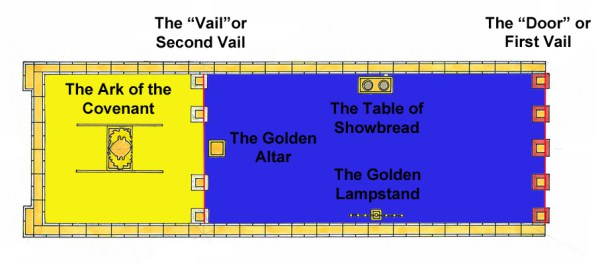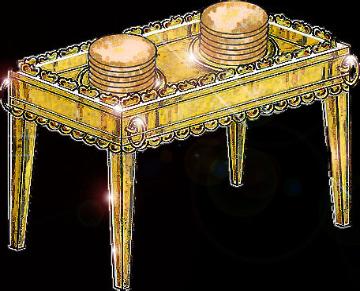"It is unfortunate that the KJV should have rendered the Hebrew word
zer by the English word “
crown” in
Exod. 25:11, 25; 30:3, 4; 37:2, 11, 12, 26, 27. The word most certainly does not mean crown in the commonly accepted sense of that word. Rather, it signifies a bit of “
ornamental molding” serving the purpose of circumscribing a specific area for a particular purpose.
There were but three pieces of furniture belonging to the ancient Tabernacle that had such “
crowns.” These were
the Ark of the Covenant (
Exod. 25:11; 37:2),
the Altar of Incense (
Exod. 30:3, 4; 37:26, 27), and
the Table of the Showbread (
Exod. 25:24, 25; 37:11, 12).
The “
crowns” were symbols of certain specific divine purposes, ordained for accomplishment at certain stages of the Church’s development. These purposes involve both time and place. The time features are suggested by the placement of the furnishings to which the “
crowns” were attached.
The “
crowns” on the Table of the Showbread and the Incense Altar represent certain divine purposes to be accomplished upon the Church while she is still in the “
Holy” or
spirit-begotten condition “
this side the Vail.” Those on the Ark of the Covenant represent the divine purpose to be accomplished upon the Church in glory—the
spirit-born condition “
beyond the Vail.”
The fact that the
Table of the Showbread was located directly opposite the
Golden Candlestick, whereas the Incense Altar was farther on, just in front of the Vail, seems to imply that the Church as an antitypical priesthood, must first be “
enlightened by the `Golden Candlestick’ (God’s Word) respecting spiritual things, `the deep things of God,’ ” and “
refreshed and strengthened daily with the truth, as represented in the `showbread,’ lawful for only the Priests to eat (
Matt. 12:4),” before it can offer sweet incense at the
Golden Incense Altar.”
As a frame (or crown molding) sets apart and glorifies the picture within it, just so is the Church set apart, sanctified and glorified as the divine decrees and purposes are accomplished in and upon her.
The decrees or purposes of God, as suggested by these “
crowns” are:
On the Table—that the Church not only “
receive” the Word of Life, but that she also hold it forth to others.
On the Altar—that the Church within a specified time develop a crystallized character likeness unto Jesus. (
Rom. 8:29)
On the Ark—that throughout all the ages of eternity, the Church shall “
hold” Christ Jesus to be her “
head.”
Although the Hebrew
zer has in this connection been arbitrarily rendered “
crowns,” the reference is in reality to something like a molding or framework. However, were we to retain the thought of “
crowns” as such, we would suggest that they represented, for those who are striving for joint-heirship in the Kingdom, their hope of “
glory, honor and immortality.” (
Rom. 2:7)
As for your second question: why was the crown upon the miter designated by God as Holy and not the rest?
All the items pertaining to the Tabernacle were holy, some more so than others, as for the significance of the Golden Mitre worn upon the High Priests head and inscribed with the words “
HOLINESS TO THE LORD” this proclaimed that: This High Priest (the anti-type) is entirely devoted to the accomplishment of Jehovah’s purposes. The golden crown also proclaimed his royalty: Christ is to be `
a priest upon his throne’—`
a priest forever after the order of Melchisedec.’—
Zech. 6:13; Psa. 110:4; Heb. 7:17.” Excerpts taken form Brother Fray’s “
Notes on the Tabernacle”



